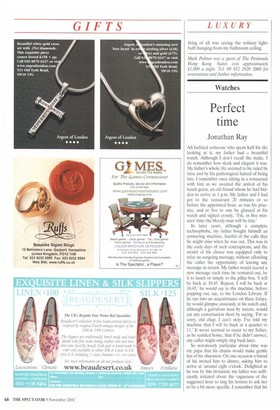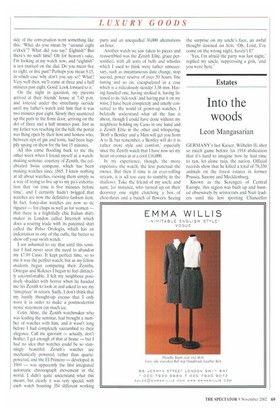Perfect time
Jonathan Ray
AS befitted someone who spent half his life looking at it, my father had a beautiful watch. Although I don't recall the make, I do remember how sleek and elegant it was. My father's whole life seemed to be ruled by time and by his pathological hatred of being late. I remember once sitting in a restaurant with him as we awaited the arrival of his lunch guest, an old friend whom he had bidden to arrive at 1 p.m. My father and I had got to the restaurant 20 minutes or so before the appointed hour, as was his practice, and at five to one he glanced at his watch and sighed crossly, `Tsk, in five minutes' time the bloody man will be late.'
In later years, although a complete technophobe, my father bought himself an answering machine, fearful of the calls that he might miss when he was out. This was in the early days of such contraptions, and the model of his choice was equipped only to relay an outgoing message, without affording the caller the opportunity of leaving any message in return. My father would record a new message each time he ventured out, be it to lunch or simply to the pillar box. 'I will be back at 1045. Repeat, I will be back at 10.45,' he would say to the machine, before popping out, say, to the London Library. If he ran into an acquaintance on these forays, he would glimpse anxiously at his watch and, although a garrulous man by nature, would cut any conversation short by saying, 'I'm so sorry, old chap. I can't stop, I've told my machine that I will be back at a quarter to 11.' It never seemed to occur to my father, as he scuttled home, that if he didn't answer, any caller might simply ring back later.
So notoriously particular about time was my papa that his chums would make gentle fun of his obsession. On one occasion a friend of his invited him to dinner, asking him to arrive at 'around eight o'clock', Delighted as he was by this invitation, my father was sufficiently irritated about the vagueness of the suggested hour to ring his hostess to ask her to be a bit more specific. I remember that his side of the conversation went something like this: 'What do you mean by "around eight o'clock"? What did you say? Eightish? But there's no such time! Oh for heaven's sake, I'm looking at my watch now, and "eightish" is not marked on the dial. Do you mean five to eight, or five past? Perhaps you mean 8.15, in which case why don't you say so? What? Very well then, we'll come at three and a half minutes past eight. Good. Look forward to it.'
On the night in question, my parents arrived at their friends' house at 7.45 p.m. and loitered under the streetlamp outside until my father's watch told him that it was two minutes past eight. Slowly they sauntered up the path to the front door, arriving on the dot of three and a half minutes past. Just as my father was reaching for the bell, the portal was flung open by their host and hostess who, between sips of gin and tonic, had been happily spying on them for the last 15 minutes.
All this came flooding back to me the other week when I found myself at a watchmaking seminar, courtesy of Zenith, the celebrated Swiss company, which has been making watches since 1865. I knew nothing at all about watches, viewing them simply as a way of trying to live up to my pa's exhortation that 'on time is five minutes before time', and I certainly hadn't twigged that watches are now the definitive fashion item. In fact, fancy-dan watches are now so de rigueur — for chaps as well as for women — that there is a frightfully chic Italian shirtmaker in London called Interno8 which does a roaring trade with its patented shirt called the Polso Orologio, which has an indentation in one of the cuffs, the better to show off your swish watch.
I am ashamed to say that until this seminar I had never seen the need to abandon my £7.99 Casio. It kept perfect time, so to me it was the perfect watch; but as my fellow students began comparing their Zeniths. Omegas and Rolexes I began to feel distinctly uncomfortable. I felt my neighbour positively shudder with horror when he handed me his Zenith to look at and asked to see my 'timepiece' in return. Sadly, I don't think that my hastily thought-up excuse that I only wore it in order to make a postmodernist ironic statement cut much ice.
Co1m Ahne, the Zenith watchmaker who was leading the seminar, had brought a number of watches with him, and it wasn't long before I had completely succumbed to their elegance. Call me ignorant — actually, don't bother, I get enough of that at home — but I had no idea that watches could be so stunningly beautiful. Zenith's watches are mechanically powered, rather than quartzpowered, and the El Primero — developed in 1969 — was apparently the first integrated automatic chronograph movement in the world. I didn't quite understand what this meant, but clearly it was very special, with each watch boasting 354 different working parts and an unequalled 36,000 alternations an hour.
Another watch we saw taken to pieces and reassembled was the Zenith Elite, grace personified, with all sorts of bells and whistles which I used to think were rather unnecessary, such as instantaneous date change, stop second, power reserve of over 50 hours, fine tuning and so on, encapsulated in a case which is a ridiculously slender 3.38 mm. Having handled one, having stroked it, having listened to its 'tick-tock' and having put it on my wrist, I have been completely and utterly converted to the world of grown-up watches. I belatedly understand what all the fuss is about, though I could have done without my neighbour holding my Casio in one hand and a Zenith Elite in the other and whispering. 'Both a Bentley and a Mini will get you from A to B. but remember. a Bentley will do it in rather more style and comfort,' especially since the Zenith watch that I have now set my heart on comes in at a cool £16,000.
In my experience, though, the more expensive the watch, the less punctual the owner. But then if time is an ever-rolling stream, it is all too easy to stumble in the shallows. Take the friend of my uncle and aunt, for instance, who turned up on their doorstep one night clutching a box of chocolates and a bunch of flowers. Seeing the surprise on my uncle's face, an awful thought dawned on him. Oh, Lord, I've come on the wrong night, haven't I?'
'Yes, I'm afraid the party was last night,' replied my uncle, suppressing a grin, 'and you were here.'



















































































































 Previous page
Previous page